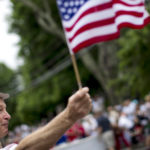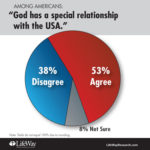NASHVILLE, Tenn.—Most Americans believe church is on the decline, even though the overwhelming majority say they find value in attending.
A new survey from Nashville-based LifeWay Research reveals an upbeat attitude toward churchgoing. Two-thirds of Americans think attendance is admirable, and nearly nine in 10 call it acceptable. Only 11 percent consider church useless.
Even nonreligious people have favorable opinions. Eighty percent believe church attendance is acceptable, and 43 percent label it admirable. Just 29 percent call it useless.
Yet more Americans believe the church is dying than thriving, the LifeWay study revealed.
“Americans have a much more optimistic view of the people and practice of attending church than they do of the health of the church,” said Scott McConnell vice president of LifeWay Research. “Church attendance is much like regular exercise and driving the speed limit. People do not live out everything they admire.”
Despite their professed fondness for church, Americans are more likely to believe attendance is declining (55 percent) or dying (42 percent) than growing (36 percent) or thriving (38 percent).
Mixed trends over 50 years
Their attitudes reflect the mixed trends of the past 50 years. While many mainline denominations have lost membership, some have grown. And while more people identify as Christian today than in 1970, Christians make up a smaller share of the burgeoning population, according to a study from Gordon-Conwell Theological Seminary.
Faced with those trends, many churches have shifted toward contemporary worship styles and new outreach methods. Nevertheless, 27 percent of Americans think church attendance is outdated, LifeWay research found. That belief is even more pronounced among the nonreligious (42 percent), Catholics (31 percent) and people 25 to 34 years old (34 percent).
Sign up for our weekly edition and get all our headlines in your inbox on Thursdays
 Those young adults, part of the Millennial generation, also are more likely than their elders to describe church attendance as unusual (26 percent). Compared to previous generations, fewer Millennials claim religious affiliation or profess belief in God, according to the Pew Research Center.
Those young adults, part of the Millennial generation, also are more likely than their elders to describe church attendance as unusual (26 percent). Compared to previous generations, fewer Millennials claim religious affiliation or profess belief in God, according to the Pew Research Center.
Young adults, like most Americans, don’t see church attendance as an assumption in today’s culture. While 54 percent of those over 65 describe churchgoing as an expectation, that viewpoint is in the minority for every other age group—a sign that those who attend are making a personal choice rather than responding to societal pressure.
Women have more positive attitudes than men about churchgoing, the LifeWay study found, with 69 percent of women and 63 percent of men viewing attendance as admirable. Only 9 percent of women consider church useless, while 14 percent of men hold that opinion.
Larger shares of women also believe in the health and vitality of the church. Forty percent of women say the church is growing, and 41 percent describe it as thriving. Among men, only 32 percent think it is growing, and 34 percent label it thriving.
Ethnic, racial differences
LifeWay Research also found significant differences along ethnic and racial lines.
Although most Hispanics believe going to church is expected (55 percent), attendance is considered useless by one in five—almost double the rate of the population as a whole.
Whites are among the least likely to consider church useless (8 percent), but 60 percent believe the church is declining.
In contrast, most African-Americans believe the church is growing (55 percent) and thriving (56 percent). More often than other groups, they describe church attendance as common (74 percent) and popular (61 percent).
“The longevity of the Christian church proves it is not a fad,” said McConnell. “Some Americans feel cultural expectations to attend church, but our recent research shows that those who actually do attend hold more closely to the teachings of Jesus Christ.”
Survey methodology
LifeWay researchers conducted the phone survey of Americans Sept. 19-28, 2014, using Random Digit Dialing. Sixty percent of completes were among landlines and 40 percent among cell phones. Researchers used maximum quotas and slight weights for gender, region, age, ethnicity and education to reflect the population more accurately. The completed sample is 1,000 surveys. The sample provides 95 percent confidence that the sampling error does not exceed plus or minus 3.4 percent. Margins of error are higher in sub-groups.














We seek to connect God’s story and God’s people around the world. To learn more about God’s story, click here.
Send comments and feedback to Eric Black, our editor. For comments to be published, please specify “letter to the editor.” Maximum length for publication is 300 words.